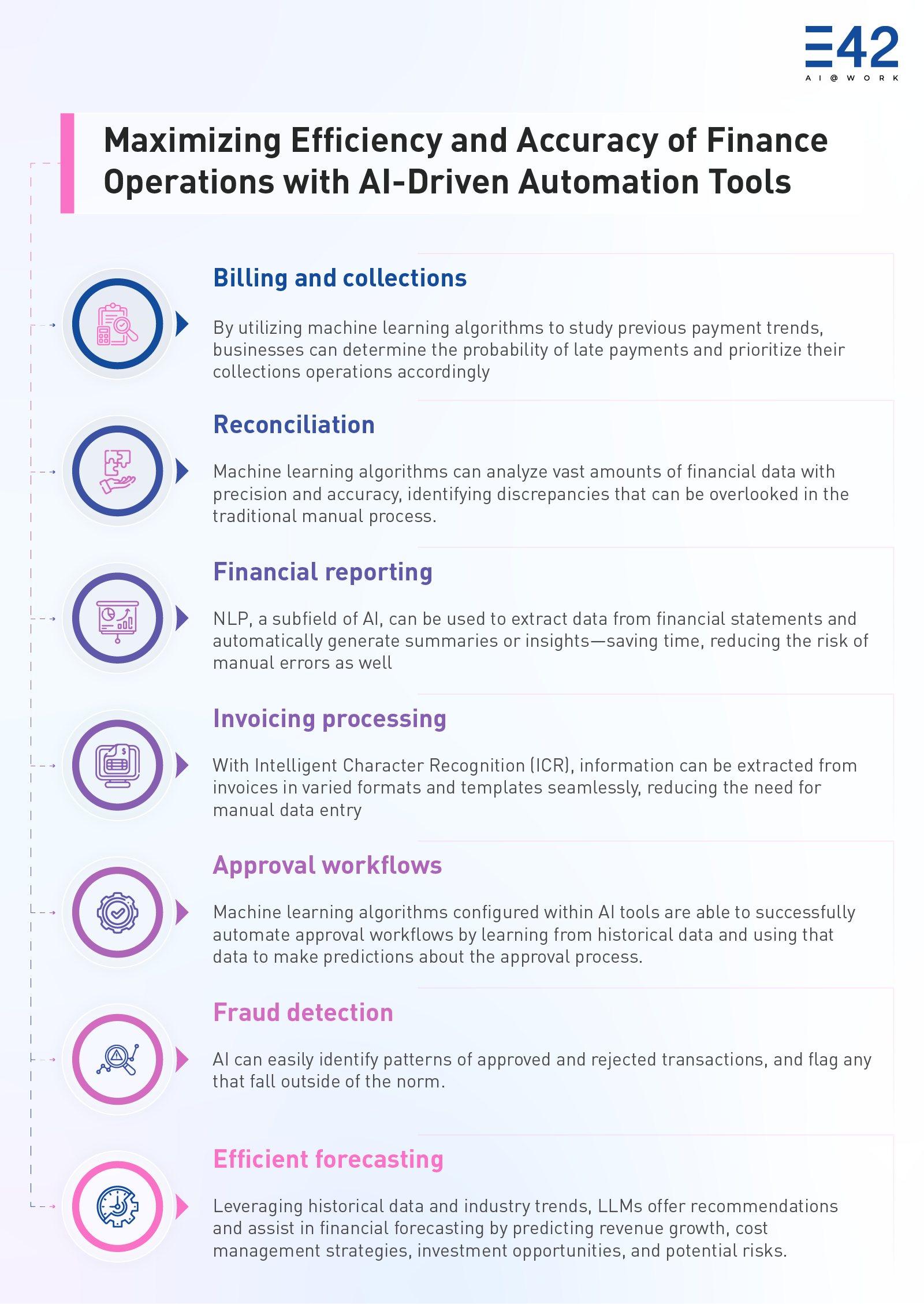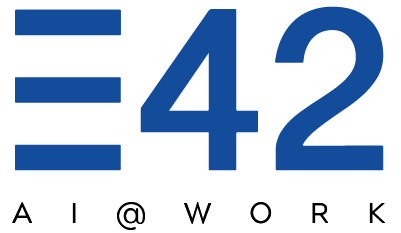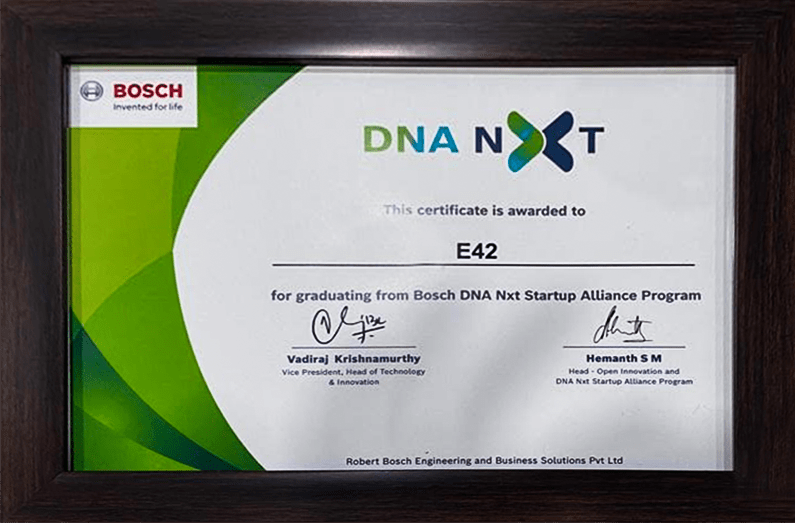Tired of sifting through piles of paper and drowning in spreadsheets? Fear not, dear financial warriors! The cavalry arrived in the form of AI. With the help of AI-based automation tools in accounting and finance, enterprises can say goodbye to mind-numbing tedious tasks and focus on what’s important—the strategy, analysis, and management of financial operations. In this article, we will dive deep into and explore the nuances of how AI-powered automation tools are transforming the way enterprises conduct their financial operations.

Maximizing Efficiency and Accuracy with AI-Driven Automation Tools
Let’s start by looking at the myriad of finance processes where AI-driven automation can be implemented to revolutionize the overall accounting and finance operations of an enterprise!
Billing and Collections
Here’s some information—credit insurance firm Atradius conducted a study that found that payment delays were a major concern for companies around the world. On average, 41% of companies in the region reported a deterioration in customer payment practices in the past year (US: 47%, Mexico: 44%, Canada: 32%). Payment delays affected 47% of the total value of B2B loan sales (US: 50%, Mexico: 45%, Canada 48%). USMCA (United States, Mexico, and Canada Agreement) companies registered 6% of invoices as questionable (US: 8%, Mexico: 5%, Canada 5%).
AI-led automation tools in finance and accounting enable the simplification of multiple tasks and enhances precision. By utilizing machine learning algorithms to study previous payment trends, businesses can determine the probability of late payments and prioritize their collections operations accordingly. AI in accounts payable enables enterprises to take preventative measures, reducing payment delays and optimizing their cash flow.
Reconciliation
Reconciliation involves comparing financial records to identify discrepancies or errors and has traditionally been a laborious and time-consuming process. However, machine learning algorithms within AI tools are used to automate the process, making it faster and more efficient. These algorithms are capable of analyzing vast amounts of financial data with precision and accuracy, identifying discrepancies or errors that may have been overlooked in the traditional manual process.
According to a McKinsey Global Institute report, AI can reduce matching time by up to 90% while improving accuracy. This is especially important for businesses with high transaction volumes, such as finance or retail. Moreover, automation in finance and accounting along with the reconciliation process allows for greater efficiency, freeing up valuable time and resources that can be utilized in other areas of the business. This, in turn, leads to increased productivity, reduced costs, and ultimately, higher profits.
Financial Reporting
The integration of AI-powered automation is transforming the accounting and finance reporting landscape, allowing businesses to streamline reporting-related activities and significantly improve the accuracy level of their tasks. This process entails the creation and dissemination of financial statements to external stakeholders like investors, regulators, or creditors. Natural Language Processing (NLP), a subfield of AI, can be used to extract data from financial statements and automatically generate summaries or insights—saving time, reducing the risk of manual errors as well.
According to an EY report, AI-based automation in accounting and finance can reduce the time spent on financial reporting by up to 50% while improving the quality and consistency of reports. By automating financial reporting, companies can make more informed decisions based on their financial data while streamlining compliance and regulatory reporting processes. Overall, AI-based finance process automation can help businesses increase efficiency, reduce costs, and improve overall financial performance.
Invoice Processing
The process includes receiving, checking, and recording invoices for goods or services received. With Intelligent Character Recognition (ICR), information can be extracted from invoices in varied formats and templates seamlessly, reducing the need for manual data entry. According to a report by Ardent Partners, companies that automate invoice processing can reduce processing costs by up to 90% by improving accuracy and reducing the risk of fraud. Large companies can now take a deep breath and free up their resources for more strategic pursuits, thanks to accounts payable automation with AI. By implementing such advanced technologies, businesses can streamline their operations, increase efficiency, and most importantly, see a remarkable improvement in their bottom line.
Approval Workflows
Instrumental in dictating how financial transactions are approved and authorized within a company, these workflows typically ensure that financial transactions are reviewed and approved by the right people in the organization, based on predefined rules and thresholds. Machine learning algorithms configured within AI tools are able to successfully automate approval workflows by learning from historical data and using that data to make predictions about the approval process. These algorithms use predefined rules and conditions to determine which invoices need approval and how to route them through the workflow.
For example, an algorithm might learn that invoices over a certain amount always require the approval of a specific person, or that certain suppliers consistently provide high-quality products and can be fast-tracked through the approval process. Once these rules are defined, the algorithm can automatically route invoices for approval without manual intervention. As more information is collected and the algorithm continues to learn, it becomes even more accurate and efficient at predicting and targeting acceptable invoices.
Fraud Detection
AI-led automation tools in accounting and finance can help detect fraudulent transactions with the use of historical data and machine learning algorithms. AI can easily identify patterns of approved and rejected transactions and flag any that fall outside of the norm. NLP can even be used to identify suspicious messages or documents.
By automating these processes, businesses can significantly reduce the risk of fraudulent activity, saving time and money while increasing efficiency. Additionally, AI automation in finance processes can enable real-time monitoring of transactions, allowing for immediate detection and response to any potential threats. Overall, the integration of AI technology in fraud prevention measures is crucial in safeguarding financial operations and maintaining trust with customers and stakeholders.
Financial Forecasting
Large language models (LLMs) possess the ability to interpret a company’s financial performance by analyzing financial statements and assessing metrics, ratios, and trends. They can cross-reference this data with industry benchmarks to provide insights on the company’s position within the industry. Leveraging historical data and industry trends, LLMs offer recommendations and assist in financial forecasting by predicting revenue growth, cost management strategies, investment opportunities, and potential risks.
Why You Should Implement AI Automation in Your Accounting and Finance Operations
AI is transforming financial operations in two significant ways. First, AI enables real-time decision-making by analyzing financial data to detect trends, identify patterns, and highlight anomalies. This allows businesses to respond quickly to changes in market conditions, financial performance, or operational efficiency. AI can also be used to develop predictive models that anticipate future financial trends and identify opportunities for growth or cost savings. Secondly, AI can help reduce costs in finance processes by automating repetitive tasks such as data entry, invoice processing, and reconciliation. This reduces the need for manual labor and frees up time for employees to focus on higher-value tasks, while also reducing the risk of human error. By leveraging AI-powered automation tools in accounting and finance processes, financial analysts can make informed decisions that help businesses stay ahead of the competition and react quickly to changing market conditions. Finance process automation software, once implemented, can automatically alert analysts to potential issues or opportunities, allowing for rapid response and decision-making. Additionally, AI can identify areas where cost savings can be made, such as detecting billing errors or singling out vendors with high prices. These benefits can help companies increase profitability, improve their bottom line, and stay competitive in today’s fast-paced business world.
Conclusion
Empowering AI-led automation in accounting finance can ensure secure and seamless expansion. From improved efficiency to enhanced risk management, the benefits of AI-powered implementation are significant, and the risks are minimal. With the potential to add close to $16 trillion to the global economy by 2030, and the ability to deliver efficiency and convenience, AI-led automation has the power to digitally transform the financial operations of a business, regardless of its industry. From streamlining routine tasks to predicting consumer behavior, AI in finance industry is enabling businesses to make smarter decisions and gain a competitive edge by facilitating finance automation. The possibilities of AI are endless, and it’s clear that enterprises that embrace this technology will thrive in the digital age.
Streamline Your Finance Operations with E42
E42 is a no-code Cognitive Process Automation (CPA) platform to build AI co-workers that are capable of automating various business processes with high speed and accuracy. Embracing AI-led tech is the way forward, and our AI co-workers are specifically built for the finance space including Accounts Payable, Accounts Receivable, financial reporting, and more. With the power of detecting anomalies that can be overlooked by humans and accomplishing work that is equivalent to the productivity of an entire human team – these AI co-workers promise ROI by digitally transforming the finance function of enterprises across sectors. To embark on your finance transformation journey, get in touch with us at interact@e42.ai today!



